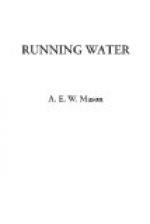resting on the slope within reach, and which we could
hardly avoid touching. It did not look very secure.
So I put out my hand and just touched it—quite,
quite gently. But it was so exactly balanced
that the least little vibration overset it, and I saw
it begin to move, very slowly, as if it meant no harm
whatever. But it was moving, nevertheless, toward
me. My chest was on a level with the top of the
cleft, so that I had a good view of the boulder.
I couldn’t do anything at all. It was much
too heavy and big for my arms to stop and I couldn’t
move, of course, since I was standing on Jack Lattery’s
shoulders. There did not seem very much chance,
with nothing below us except two thousand feet of
vacancy. But there was just at my side a little
bit of a crack in the edge of the cleft, and there
was just a chance that the rock might shoot out down
that cleft past me. I remember standing and watching
the thing sliding down, not in a rush at all, but very
smoothly, almost in a friendly sort of way, and I wondered
how long it would be before it reached me. Luckily
some irregularity in the slope of rock just twisted
it into the crack, and it suddenly shot out into the
air at my side with a whizz. It was so close to
me that it cut the cloth of my sleeve. I had
been so fascinated by the gentle movement of the boulder
that I had forgotten altogether to tell Lattery what
was happening; and when it whizzed out over his head,
he was so startled that he nearly lost his balance
on the little shelf and we were within an ace of following
our rock down to the glacier. Those were our early
days.” And he laughed with a low deep ring
of amusement in his voice.
“We were late that day on the mountain,”
he resumed, “and it was dark when we got down
to a long snow-slope at its foot. It was new ground
to us. We were very tired. We saw it glimmering
away below us. It might end in a crevasse and
a glacier for all we knew, and we debated whether we
should be prudent or chance it. We chanced the
crevasse. We sat down and glissaded in the dark
with only the vaguest idea where we should end.
Altogether we had very good times, he and I. Well,
they have come to an end on the Glacier des Nantillons.”
Chayne became silent; Sylvia Thesiger sat at his side
and did not interrupt. In front of them the pastures
slid away into darkness. Only a few small clear
lights shining in the chalets told them there were
other people awake in the world. Except for the
reverberation of the torrent deep in the gorge at
their right, no sound at all broke the deep silence.
Chayne knocked the ashes from his pipe.
“I beg your pardon,” he said. “I
have been talking to you about one whom you never
knew. You were so quiet that I seemed to be merely
remembering to myself.”
“I was so quiet,” Sylvia explained, “because
I wished you to go on. I was very glad to hear
you. It was all new and strange and very pleasant
to me—this story of your friendship.
As strange and pleasant as this cool, quiet night
here, a long way from the hotels and the noise, on
the edge of the snow. For I have heard little
of such friendships and I have seen still less.”




